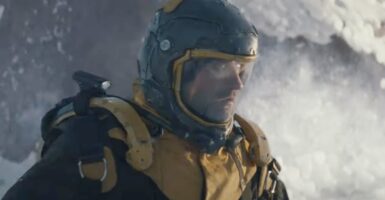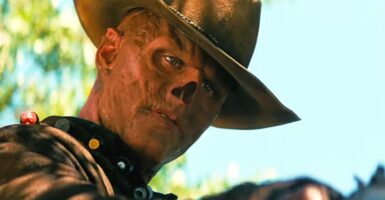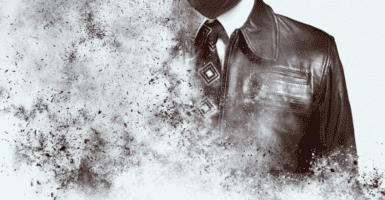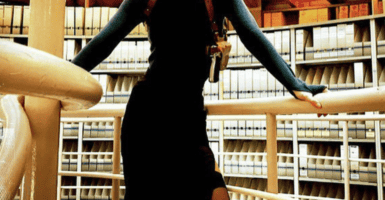Star Trek Screenwriter Roberto Orci On Choosing Into Darkness’ Villain
This article is more than 2 years old
It’s safe to say that there was a fair bit of discussion revolving around the villain of Star Trek Into Darkness in the months leading up to its release. I don’t have an exact total, but if I had a nickel for every word I wrote on the subject in the last year, I would have no place to store all those nickels and I would regret not just asking for a check. But now that the movie’s out and the rumors, denials, and obfuscations are done, the folks who wrote the movie are free to talk about it in a candid way. StarTrek.com recently sat down with Into Darkness co-writer Roberto Orci, who discussed the path to the film’s villain, and the balance he and his fellow writers, Alex Kurtzman and Damon Lindelof, tried to strike between honoring Trek history and creating a new story that could stand on its own.
SPOILERS FOR STAR TREK INTO DARKNESS BELOW!
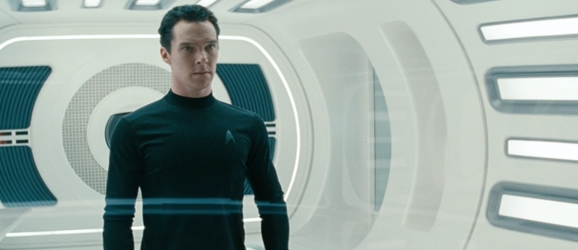
Now that most of us have seen the movie, the cat is out of the bag. Benedict Cumberbatch’s John Harrison is indeed the new universe’s version of Khan Noonian Singh. But while some elements from the still-awesome Star Trek II: The Wrath of Khan are borrowed, referenced, or outright recreated from a different angle, Into Darkness still can’t be so neatly described as an outright remake. And as Orci reveals, he was initially very much against using Khan in the sequel, but eventually came up with an approach he and the others thought worked. Here’s Orci:
In a way, (fellow co-writer and co-producer) Damon (Lindelof) and I were the biggest debaters about this. He argued for Khan from the beginning and I argued against it. The compromise that we came to was, let us devise a story that is not reliant on any history of Star Trek. So, what’s the story? Well, we have a story where our crew is who they are and they’re coming together as a family. Then, suddenly, this villain arrives and his motivations are based on what happens in the movie. They’re not based on history. They’re not based on Star Trek. They’re not based on anything that came before. They’re based on [him being] used by a corrupted system of power that held the things he held dear against him and tried to manipulate him. That story stands alone with or without Star Trek history. That’s how we approached it, and God bless Damon for going down that road.
So, once we had that, that’s when Damon came back and reared his ugly head and said, ‘OK, now that we have that, is there any reason why we cannot bring Star Trek history into this?’ And he was right. So we ended up sort of reverse engineering it. We started with, ‘What’s a good movie? What’s a good villain? What’s a good motivation? We cannot rely on what’s happened before. Now that we have that, can we tailor this villain into something that relates to Star Trek history?’ And that’s what we did. So, step one was ‘Don’t rely on Star Trek.’ Then, step two was ‘Rely on Star Trek.’
Whether it was smart for Abrams and his writers to use Khan or not will still be argued about for years to come, once they decided to make that decision, for the most part I think they went about it the right way: crafting a new story in which Khan is awakened in a different way, by different people, and then letting events snowball outward from that singular difference from the original Star Trek timeline.
While some differences in the new Trek filmes can’t be explained away simply by the altered timeline — Khan’s metamorphosis into a pasty British dude, for one — some of those just come down to practical issues, such as casting the best actor they could find for the role. When it comes to the freedom the new timeline provides, however, Orci says that the new timeline still needs to “harmonize with canon.” He explains, dipping into quantum mechanics:
Leonard Nimoy didn’t just go back and change history (as Spock Prime in the 2009 film), and then everything is like Back to the Future. It’s using the rules of quantum mechanics, which means it’s an alternate universe where there is no going back. There is no fixing the timeline … So, on the one hand we’re free. On the other hand, these same rules of quantum mechanics tell us that the universes that exist, they exist because they are the most probable universe.
…the things that happened in The Original Series didn’t just happen because they happened, they happened because it’s actually what’s most probably going to happen … On the other hand, our whole point was to give all of our characters free will again. They truly have free will. The universe is not written. The future is not written. And it’s not clear what’s going to happen. It’s going to up to what the characters do. Be it us as the next writers or someone else who has a better idea, may these characters fulfill their destinies according to their own devices and their own free will.
You can read our review of Star Trek Into Darkness right here.




